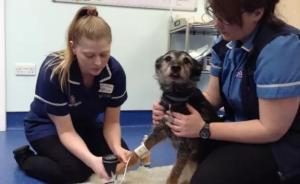
By Veterinary Nurse Ayesha Watson
One of the most important pieces of advice I can share is the importance of bringing your older pet in for a check-up sooner rather than later.
Your more senior dog or cat may seem like there is nothing wrong with them, but it’s not always possible to tell what’s happening on the inside.
Older animals are prone to some conditions which can be managed if they are caught early, but which can have serious consequences if they are left to develop.

One of the first things we will do is check their blood pressure which gives us a good indicator of how they are doing.
Hypertension or high blood pressure isn’t something you would necessarily notice but if that is left untreated your pet can lose their sight.
Some conditions do not show themselves until they have become quite advanced. An example is kidney disease which is common in older dogs and especially cats. By the time symptoms of kidney disease become apparent 75 per cent of damage has already been done. During a health check we can run blood tests which will show what’s happening and allow us to start managing it.
Maintaining a healthy weight reduces pressure on joints and organs like the heart. If we identify arthritis, we can begin to slow down its progress and manage pain with options such as laser therapy, physiotherapy, acupuncture or an exercise plan and medication if necessary.
Just as importantly we need to check your pet is not becoming underweight which can result from kidney disease or hyper-thyroidism (an over-active thyroid).
We can advise on joint supplements and senior diets which are designed especially to help oldies maintain correct weight and nutrition.
Simple tips like raising the food bowl to take the strain off the neck and shoulders can make a difference. We can help with lots of ideas once we know where your pet is experiencing difficulty.
We class an average sized breed of dog like a Labrador as old from the age of seven or eight, and from five for giant breeds which have a shorter life span. We class cats as old when they reach nine. We advise clients to bring their older animals in for a check-up twice a year.
Taking care of older pets can make a massive difference. It is a pleasure seeing them when you have made a real difference to them, and they are more comfortable again and enjoying life.